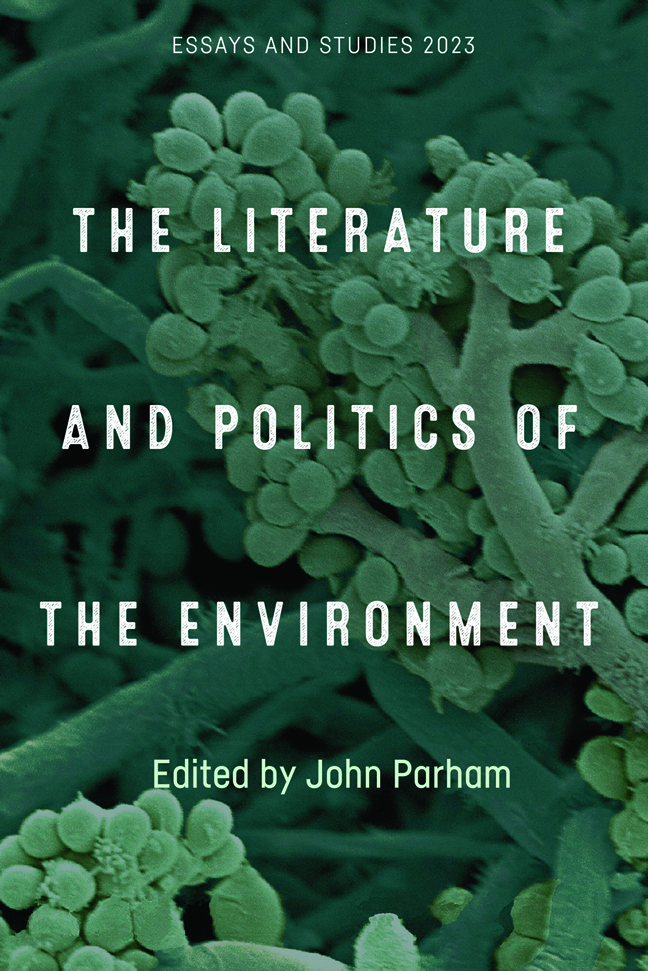Book contents
- Frontmatter
- Contents
- Notes on Contributors
- Acknowledgements
- Introduction
- 1 Industry and Environmental Violence in the Early Victorian Novel: Pastoral Re-visions
- 2 Floating Cities, Imperial Bodies: Reading Water in Timothy Mo’s An Insular Possession (1986) and Xi Xi’s ‘Strange Tales from a Floating City’ (1986)
- 3 Sweet Food to Sweet Crude: Haunting Place through Planet
- 4 Nonhuman Entanglements in Adam Roberts’s Science Fiction: Bête (2014) and By Light Alone (2012)
- 5 Sum deorc wyrd gathers: Dark Ecology, Brexit Ecocriticism, and the Far Right
- 6 Literature, Literary Pedagogy, and Extinction Rebellion (XR): The Case of Tarka the Otter
- 7 The View from the Field: Activist Ecocriticism and Land Workers’ Voices
- 8 Nature Walking: Marching Against Privilege
- 9 To Be a Witness in the World
- Index
7 - The View from the Field: Activist Ecocriticism and Land Workers’ Voices
Published online by Cambridge University Press: 02 March 2024
- Frontmatter
- Contents
- Notes on Contributors
- Acknowledgements
- Introduction
- 1 Industry and Environmental Violence in the Early Victorian Novel: Pastoral Re-visions
- 2 Floating Cities, Imperial Bodies: Reading Water in Timothy Mo’s An Insular Possession (1986) and Xi Xi’s ‘Strange Tales from a Floating City’ (1986)
- 3 Sweet Food to Sweet Crude: Haunting Place through Planet
- 4 Nonhuman Entanglements in Adam Roberts’s Science Fiction: Bête (2014) and By Light Alone (2012)
- 5 Sum deorc wyrd gathers: Dark Ecology, Brexit Ecocriticism, and the Far Right
- 6 Literature, Literary Pedagogy, and Extinction Rebellion (XR): The Case of Tarka the Otter
- 7 The View from the Field: Activist Ecocriticism and Land Workers’ Voices
- 8 Nature Walking: Marching Against Privilege
- 9 To Be a Witness in the World
- Index
Summary
Post-Brexit, the question of new legislation around farming practices in the UK has been, and continues to be, an area of heated debate. In both political and agricultural circles, the UK’s departure from the European Union was initially hailed as an opportunity to break free from the outmoded Basic Payment Scheme of the Common Agricultural Policy: to devise new strategies to cease subsidising farmers for simply owning land, and expand existing initiatives to reward farmers for producing environmental benefits as well as food. 2022 saw major upheavals in British politics (including the appointment of two new Prime Ministers in quick succession), and the long-anticipated Environmental Land Management Scheme (ELMS) in England (a multitiered plan to ‘pay farmers and land managers to enhance the natural environment alongside food production’) became subject to further review. Ranil Jayawardena (briefly Secretary of State for Environment, Food and Rural Affairs between 6 September and 25 October 2022) sought to ‘set the record straight’ in terms of the Government’s ongoing commitment to nature-friendly farming, in a film produced for social media. However, both this and Jayawardena’s speech at the 2022 Conservative Party Conference were met with scepticism by wildlife charities, the National Trust, regenerative farmers, and high-profile environmental campaigners, such as Chris Packham. The appointment of Thérèse Coffey as Jayawardena’s substitute has been greeted with ‘some surprise – and hope – by [the] environment sector’, but the final format of ELMS remains in question.
In the midst of this upheaval and anxiety, it is easy to see how some farmers may feel that their livelihoods and farming practices are at the mercy of political expediency. Such debates are not limited to the political and agricultural spheres but exist in the context of radically divided public opinion on food production, in which, more often than not, farmers ‘are taking a bashing’, as James Rebanks puts it. ‘You can’t go on social media, turn on the TV or radio, or read a newspaper without someone telling you earnestly that farming is more or less the devil’s work and should be done away with at the earliest opportunity’. These cultural tensions have come to the fore with the publication of George Monbiot’s Regenesis: Feeding the World without Devouring the Planet (2022).
- Type
- Chapter
- Information
- The Literature and Politics of the Environment , pp. 127 - 146Publisher: Boydell & BrewerPrint publication year: 2023



